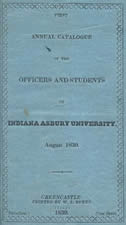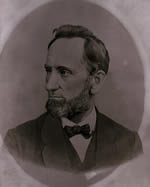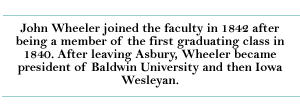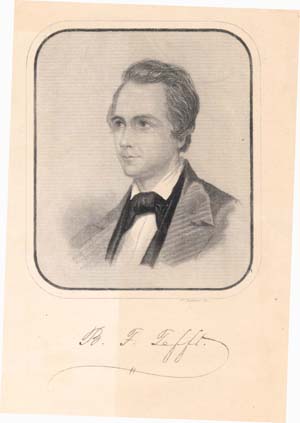|

Pages:
<< Back 1
2 3 4
5 6 7
8 9 10
Next >>
Finally
in February 1839, Matthew Simpson,
of Allegheny College, after earlier turning down the professorship
of mathematics, accepted the presidency of Indiana Asbury University.
The first official listing of Indiana Asbury faculty in 1839 included
Simpson, Nutt, and Weakley, plus John Wheeler, a member of the senior
class, as tutor in mathematics.
 The
1839-40 catalogue, the first to be issued, outlined a prescribed
course for the college of recitations leading after four years to
the degree of bachelor of arts. The course outline closely followed
the established pattern of the older liberal arts colleges to the
east. Arranged in two semesters of 21 weeks each, it comprised a
heavy dose of Latin, Greek, and mathematics in the first two years,
alleviated by a variety of subjects such as rhetoric, logic, ancient
history, political economy, and the law of nations in the final
two years. The capstone of the entire educational program was the
study of mental and moral philosophy and "Christian evidences"
in the senior year. This part of the curriculum was directed by
the president himself, who was indeed often called upon to teach
other courses as well. This major course was in no way a formal
philosophy course, but rather, a practical course in "right
living." In 1839-40 only 22 students were registered for the
full classical course, while 43 were listed as irregular, or non-degree,
students; and the largest number, 58, were pupils in the preparatory
department. Two literary societies,
the Platonean and Philological-usually called Plato and Philo for
short-had been organized, affording students both social fellowship
and an opportunity to supplement the rather thin prescribed curriculum
with oratorical exercises on issues of current interest.
The
1839-40 catalogue, the first to be issued, outlined a prescribed
course for the college of recitations leading after four years to
the degree of bachelor of arts. The course outline closely followed
the established pattern of the older liberal arts colleges to the
east. Arranged in two semesters of 21 weeks each, it comprised a
heavy dose of Latin, Greek, and mathematics in the first two years,
alleviated by a variety of subjects such as rhetoric, logic, ancient
history, political economy, and the law of nations in the final
two years. The capstone of the entire educational program was the
study of mental and moral philosophy and "Christian evidences"
in the senior year. This part of the curriculum was directed by
the president himself, who was indeed often called upon to teach
other courses as well. This major course was in no way a formal
philosophy course, but rather, a practical course in "right
living." In 1839-40 only 22 students were registered for the
full classical course, while 43 were listed as irregular, or non-degree,
students; and the largest number, 58, were pupils in the preparatory
department. Two literary societies,
the Platonean and Philological-usually called Plato and Philo for
short-had been organized, affording students both social fellowship
and an opportunity to supplement the rather thin prescribed curriculum
with oratorical exercises on issues of current interest.
By September 1840 the new classroom building, under construction
since 1837 and generally known simply as the Edifice,
was far enough along to provide a suitable place for the university's
first commencement and the belated inauguration of President Simpson.
On the 16th of that month, chosen because it was the eve of the
meeting of the Indiana Methodist Conference, the chapel was crowded
with visitors from around the state as Asbury's first three graduates
were recognized - Thomas A. Goodwin, Finley L. Maddox, and John Wheeler.
Joseph E. McDonald, who left college before graduation, was later
awarded a degree as a member of the class of 1840. Indiana's governor,
David Wallace, delivered the charge and presented the keys of the
university to President Simpson, who made a lengthy inaugural address
outlining the aims and objectives of higher education in terms not
altogether unlike those often heard in the university's later history.
In addition to furnishing general knowledge, colleges should promote
"a capacity for close and thorough investigation, ability to
communicate information in an interesting and successful manner, and
a disposition to use the utmost exertions for the amelioration of
the conditions of mankind." The ceremony concluded with an evening lecture to the
literary societies by the 26-year-old
Henry Ward Beecher of the Second Presbyterian Church in Indianapolis.
The university was launched.

Soon
additional instructors were appointed and replacements named for
those departing, as the student body gradually expanded. Most, like
their predecessors, were ordained ministers in the Methodist Episcopal
Church with little more than a classical college background. In
1840 William C. Larrabee became professor
of mathematics and natural sciences, Simpson shifting from that
field to the professorship of mental and moral philosophy. In 1842
Charles G. Downey, a graduate of Wesleyan University who had served as
tutor in mathematics at Asbuiy in 1840-41, was appointed professor
of natural science, relieving Larrabee of that portion of his responsibilities.
He remained for 15 years, including a stint in the short-lived medical
college. Another who began his career as tutor in mathematics was
Joseph Tingley, an Asbury graduate in
the class of 1846who held the professorship of natural sciences
from 1849 to 1879. 
_________________________________________
Benjamin Franklin Tefft served as professor of Greek
and Hebrew at Indiana Asbury from 1843-46. His
inaugural address at the college so impressed the board
that it ordered 1000 copies printed.
________________________________________
Back
to Top
Pages:
<< Back 1
2 3 4
5 6 7
8 9 10
Next >>
|

 The
1839-40 catalogue, the first to be issued, outlined a prescribed
course for the college of recitations leading after four years to
the degree of bachelor of arts. The course outline closely followed
the established pattern of the older liberal arts colleges to the
east. Arranged in two semesters of 21 weeks each, it comprised a
heavy dose of Latin, Greek, and mathematics in the first two years,
alleviated by a variety of subjects such as rhetoric, logic, ancient
history, political economy, and the law of nations in the final
two years. The capstone of the entire educational program was the
study of mental and moral philosophy and "Christian evidences"
in the senior year. This part of the curriculum was directed by
the president himself, who was indeed often called upon to teach
other courses as well. This major course was in no way a formal
philosophy course, but rather, a practical course in "right
living." In 1839-40 only 22 students were registered for the
full classical course, while 43 were listed as irregular, or non-degree,
students; and the largest number, 58, were pupils in the preparatory
department. Two
The
1839-40 catalogue, the first to be issued, outlined a prescribed
course for the college of recitations leading after four years to
the degree of bachelor of arts. The course outline closely followed
the established pattern of the older liberal arts colleges to the
east. Arranged in two semesters of 21 weeks each, it comprised a
heavy dose of Latin, Greek, and mathematics in the first two years,
alleviated by a variety of subjects such as rhetoric, logic, ancient
history, political economy, and the law of nations in the final
two years. The capstone of the entire educational program was the
study of mental and moral philosophy and "Christian evidences"
in the senior year. This part of the curriculum was directed by
the president himself, who was indeed often called upon to teach
other courses as well. This major course was in no way a formal
philosophy course, but rather, a practical course in "right
living." In 1839-40 only 22 students were registered for the
full classical course, while 43 were listed as irregular, or non-degree,
students; and the largest number, 58, were pupils in the preparatory
department. Two 

